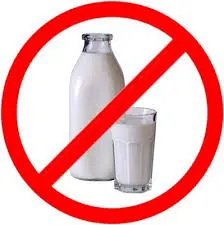Do you know about the advantages and disadvantages of dairy free products?
Let us know about this in brief .

What is Dairy-Free?
For both health and ethical reasons, dairy products raise serious concerns. On the health side, countless people who’ve quit dairy witnessed enormous improvements to their well-being.
Maladies like nasal congestion, digestive problems, acne, or chronic ear infections may vanish within a few weeks. You might therefore consider going dairy-free for a month to see if doing so significantly improves your quality of life.
Nutritionally speaking, dairy brings lots of bad news. Nearly all of its carbohydrates come from sugar—all of it in the form of lactose, which many people can’t properly digest. Upwards of 80 percent of people of Asian descent, and 70 percent of people of African descent, can’t properly digest lactose. In fact, lactose intolerance afflicts large numbers of people in every part of the world.
So if you suffer from chronic digestive issues, eliminating dairy products may resolve your problems. Almost half of the calories in whole milk come from fat.
Worse yet, this fat is highly saturated—making it as bad for your heart as beef fat (tallow) or pig fat (lard). Dairy also has absolutely no fiber or iron. And if all that were not enough, you might contemplate why the FDA refuses to answer the question about whether milk products contain pus.
Pros
A dairy-free diet is not necessarily for everyone unless, of course, you have an allergy or intolerance. If you do, or just prefer to avoid dairy, the diet does have several advantages.
Necessity:
In the case of milk allergy, a dairy-free diet is essential to avoid exposure and possibly dangerous allergic reactions.
Helpfulness:
For those who have lactose intolerance or other sensitivity to dairy products, avoiding them can help ease uncomfortable and painful symptoms.
Safety
A dairy-free diet is safe, as long as people who follow it make sure to get enough calcium and other nutrients typically found in dairy products.
Accessibility
Milk substitutes and other dairy-free products are readily available in most supermarkets.
Flexibility
Those who avoid dairy due to sensitivity or intolerance may be able to consume small amounts of dairy products. Levels of insensitivity and intolerance can vary greatly. Those with a milk allergy must carefully avoid all dairy products.
Sustainability
As long as nutritional needs are met, this diet can be followed indefinitely (although many children do outgrow their milk allergy).
Cons
If you have an allergy or intolerance, you’ll need to follow a dairy-free diet regardless of the drawbacks. But they are usually manageable.
Practicality
Following a dairy-free diet requires some planning to make sure that you have access to foods that are safe for you (for example, when eating at a restaurant or friend’s home). It also requires planning to ensure that your nutritional needs are being met with non-dairy sources of protein, calcium, vitamin D, and so on. • Cost: Some milk substitutes and other dairy-free items are more expensive than their dairy counterparts.
Sustainability
It is reasonably easy and straightforward to avoid milk and milk products, but eliminating dairy from your diet entirely can be challenging since many foods contain trace amounts of the proteins found in dairy.

